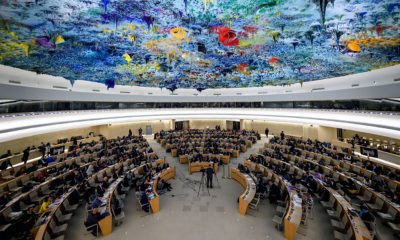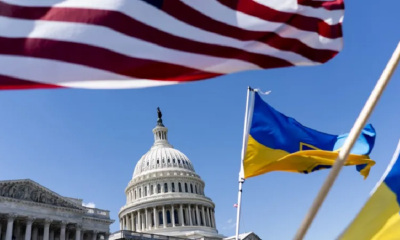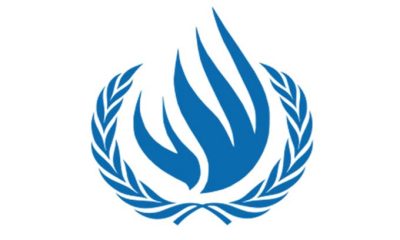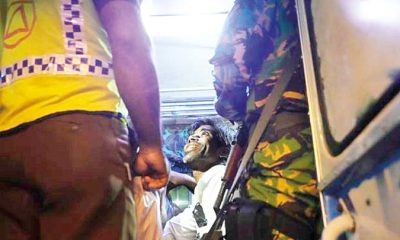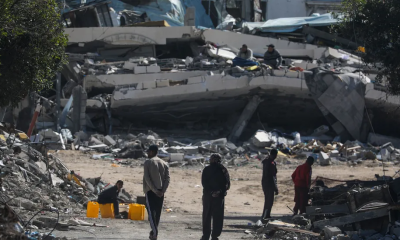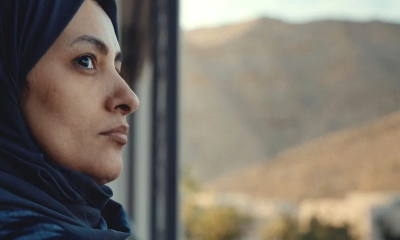Features
Human rights and US double standards
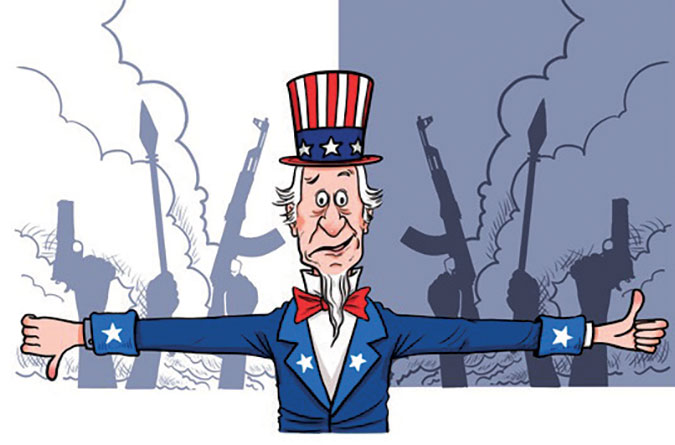
By Daya Gamage
Foreign Service National Political Specialist (ret) U.S. Department of State
In November 2019, President Donald Trump granted clemency to three controversial US military figures charged with war crimes, arguing that such moves would give American troops “the confidence to fight” without worrying about potential legal repercussions. Two army officers were granted full pardons for the murder of Afghans. Trump also restored the rank of a special warfare operator who had been tried for a string of alleged war crimes. It was claimed that the criminal charges were an overreaction to actions taken in the chaos and confusion of battle. Such actions validate the widely-held view that the US does not hold itself to the same standards it tries to impose on them.
If Sri Lanka has an iota of dignity – I am not suggesting a free-for-all with Washington – it should make ‘some’ diplomatic moves on the basis of the following:
The American Service-Members Protection Act (ASPA) was an amendment to the 2002 Supplemental Appropriations Act (House Resolution 4775) passed in response to the 9/11 terrorist attacks and the launch of the so-called Global War on Terror. The ASPA aims to “protect U.S. military personnel and other elected and appointed officials of the Government against prosecution by an international criminal court to which the U.S. is not a party.” Among other defencive provisions the Act prohibits federal, state and local governments and agencies (including courts and law enforcement agencies) from assisting the International Criminal Court (ICC) in The Hague. It even prohibits U.S. military aid to countries that are parties to the Court. In 2002, during the administration of Prime Minister Wickremesinghe, Sri Lanka signed with the U.S. an “Article 98 Agreement,” agreeing not to hand over U.S. nationals to the Court. This was done under pressure during the 2002-2004 ‘Peace Talks’ in which Secretary of State Gen. Colin Powel and his Deputy Richard Armitage were directly involved in lifting the terrorist/separatist LTTE on par with the legitimate government of Sri Lanka.
This shows the hypocrisy and double standards of Washington policymakers who, with no substantial data and evidence, relied on information furnished by an NGO to blacklist former Navy Commander, Admiral of the Fleet Wasantha Karannagoda.
In September 2009, four months after the conclusion of the Eelam War IV, the US Senate Appropriations Committee had mandated that the State Department prepare a report on possible war crimes committed during the final phase of the conflict during 2008-2009 in Sri Lanka. (It should be mentioned that when the ICC decided to send officials during the Trump administration to Washington to interview USG personnel on US atrocities in Afghanistan, USG suspended their visas and declared that the US was a sovereign nation for such interference). The report was completed in October despite acknowledged evidentiary limitations, but the allegations it uncovered of abuses by government officials defined thereafter the policy of the US and some EU countries toward the Government of Sri Lanka (GoSL). The report’s findings, based largely on hearsay, also created an atmosphere of credibility about human rights violations that was exploited for anti-Colombo propaganda by activist sections of the Tamil Diaspora. The US Ambassador-at-Large for War Crimes Issues articulated a double standard that was common in the US foreign policy establishment at that time. He acknowledged “that honestly in a conflict like that against the LTTE it was necessary to use very strong force to defeat a group that was committing horrendous crimes against the civilian population. But on the other hand, that action had to comply with the laws of war.” A democratic government, in other words, was held responsible to rules of warfare that autocratic insurgents were not, even though that would mean that the democratic government could be handicapped in defending its sovereignty, system of government, and domestic rule of law. Such accountability, of course, did not apply to the US.
These disgraceful double standards of Washington policymakers and lawmakers in dealing with Sri Lanka’s ‘national issues’ since the advent of the separatist war in the north in the 1980s are now very broadly dealt with by two personnel who worked within the U.S. Department of State for thirty years in the area of foreign affairs: One is this writer who is a retired Foreign Service National Political Specialist once accredited to the Political Section of the U.S. Embassy in Colombo, and the other, Dr. Robert K. Boggs, a retired Senior Foreign Service (FS) and Intelligence Officer who served as Political Counselor at the Colombo Diplomatic Mission and in many senior positions in the State Department in Washington. Their investigative work is still in progress. Their manuscript ‘Defending Democracy: Lessons in Strategic Diplomacy from U.S.-Sri Lankan Relations” is nearing completion with alarming disclosures, provocative analyses and interpretations based on their up-close and personal knowledge and understanding of Washington’s foreign policy trajectory in Sri Lanka – then and now – and how it used ‘double standards’ in handling its foreign relations with Sri Lanka reducing Sri Lanka to some level of a client state. Sri Lanka’s own infantile behaviour, ignorance of its own strengths and inarticulate manner in which it was handling foreign relations since the 1980s contributed too to become a subservient state allowing ‘national issues’ to become ‘global’ ones.
‘Moral Arbiter’
How can the US be a moral arbiter in the war against terrorism if it has never tried or prosecuted most of the Americans responsible for kidnappings, secret detentions and torture of suspects abroad after 9/11? Why has it so uncritically accepted the civilian casualty figures of international NGOs, however righteously motivated, regarding hostilities in Sri Lanka but consistently rejected them regarding its own collateral killings? And does the U.S. really believe that, because it tries sincerely to minimise harm to civilians, it is morally justified in pursuing tactics that inevitably will cause casualties among non-combatants? If so, do the compulsions of military tactics not similarly exonerate other governments fighting other groups recognised by the international community as terrorists? Are no allowances granted to military forces that do not have the U.S.’ access to precise overhead targeting intelligence and so-called precision weapons? If the U.S. can excuse itself from culpability for civilian deaths it causes in counterinsurgency operations in poor countries far from North America, are foreign governments not also excused for using their full offensive capabilities to defeat domestic terrorists posing immediate threats to their national integrity and democracy? Abuses by the United States do not excuse abuses by Sri Lanka, but U.S. abuses tarnish the U.S.’ moral authority, weaken U.S. claims to international leadership, provoke deep resentment of the U.S., and provoke even more anti-U.S. terrorism.
Contradictory position
Compounding its hypocrisy in Sri Lanka is the long US record of self-righteously shielding its own military from investigation by international human rights tribunals. Since 1986 the USG has adopted the contradictory position of supporting the rule of law in the international system by participating in litigation before the International Court of Justice (ICJ), but at the same time refusing to submit itself to the authority of the International Criminal Court (ICC) on the grounds that this would violate U.S. sovereignty. While Sri Lankan forces were fighting the LTTE, the US was unleashing massive amounts of firepower in Iraq that killed thousands of civilians. In Afghanistan the U.S. allied itself with, and thus strengthened, war lords and provincial officials with strong records as counterinsurgency fighters, but has ignored credible reports of these allies’ corruption and human rights abuses. At the same time, the U.S. has become increasingly reliant in its international campaign against extremism on air power, including armed drones that routinely injures and kills civilians. Yet in September 2018 the US National Security Advisor, John Bolton, threatened sanctions against the “illegitimate” ICC if it investigated credible allegations of war crimes by U.S. military and intelligence personnel in Afghanistan. In earlier diatribes against the ICC, Bolton reportedly acknowledged that the U.S. needed immunity because its use of torture, harsh imprisonment and some counterterrorist tactics constituted crimes under international law, which he dismissed.
At the time that the United States was pressuring Colombo to accept “national, international, and hybrid mechanisms to clarify the fate and whereabouts of the disappeared,” the USG had not itself ratified the UN convention of 2006 requiring state party to criminalise enforced disappearances and take steps to hold those responsible to account. Sri Lanka need not have ‘confronted’ the US, but it had no guts to question it. The US jointly with Sri Lanka during the Wickremesinghe-Sirisena regime presented the 30/1 Resolution in UNHRC in October 2015 for ‘hybrid’ commission.
Despite a resolution passed by the U.S. House of Representatives on November 19, 2020 calling on the USG to ratify the international convention, this still has not happened. The U.S.’ long history of rejecting accountability is strongly rooted in legislation.
Washington has used different standards for the legitimate administration in Sri Lanka which was combating a separatist-terrorist movement, and its overseas advocates, fundraisers and advisors. It needs to be stressed here that Washington ignored the atrocities committed by the Tamil Tigers. A democratic government was made to abide by the rules of warfare, but the terrorists were not required to do so. Such accountability, of course, did not apply to the US.
This point of view may have been based on a legal interpretation common in the past that if a state actor in an internal conflict is a party to international covenants of humanitarian law, the state actor needs to abide by the provisions ratified by the United Nations and is responsible for any violation of International Humanitarian Law (IHL). In contrast, if the opponent of the legally constituted government is an armed non-state actor (ANSA) and therefore not a signatory to international covenants, the general opinion was that it has no obligation to uphold the provisions. However, due to the growing number of internal armed conflicts that emerged over the years, the international community was forced to realize that new interpretations or legal instruments were needed to regulate non-international conflicts with non-state participants.
Common Article 3 of the Geneva Conventions, later Protocol II, several other treaties and customary law all deal with non- international armed conflicts. Neither the U.S. nor the GSL is a signatory of Protocol II, but both are parties to Article 3. The latter requires that each Party to a conflict in the territory of one of the High Contracting Parties is proscribed from a range of inhumane behaviours, including cruel treatment and torture, the taking of hostages, and extra-legal executions. Construed broadly, many of the provisions of the Article are applicable not only to the LTTE fighting cadre but also to non-combatants supporting them by fundraising, propaganda, legal counselling, and the like. If the USG were serious about accountability, it would call for surviving Tiger leaders and their international accessories to be tried in international courts. Any questions about the legality of such action in U.S. courts were resolved in June 2010, when the US Supreme Court upheld a federal law that makes it a crime to provide material support to foreign terrorist organisations, even if that help is itself not violent. Chief Justice John Roberts, writing for the majority, said the law’s prohibition on some types of intangible assistance to groups the State Department determines engage in terrorism does not violate the First Amendment to the U.S. Constitution.
Despite this growing body of support for legal action against non-state terrorists, the USG continues to target only the GSL for human rights violations.
In February 2020, for example, the USG announced sanctions against Sri Lankan military chief Lt. Gen. Shavendra Silva, who served as a division commander leading the final assault against the Tigers. At the end of April 2023, Admiral of the Fleet Wasantha Karannagoda was declared persona-non-grata in the United States by Washington. Secretary of State Mike Pompeo announced that the U.S. would impose individual sanctions against Gen. Silva, denying him and his family admittance to the U.S., “due to gross violations of human rights.” The State Department declared the same, imposing individual sanctions against Karannagoda. Nothing similar has been said or done with regard to the expatriate Tamils, now domiciled in Western countries, who served as advisors and agents to LTTE leader Prabhakaran and his top lieutenants.
In June 2010 the US Supreme Court upheld the federal law criminalizing material support to foreign terrorist organisations in a case brought by the LTTE and the Kurdish PKK, contesting their designations as FTOs. In its written opinion the Court stated, inter alia, that:
“The PKK and the LTTE are deadly groups. It is not difficult to conclude, as Congress did, that the taint of their violent activities is so great that working in coordination with them or at their command legitimises and furthers their terrorist means. Moreover, material support meant to promote peaceable, lawful conduct can be diverted to advance terrorism in multiple ways. The record shows that designated foreign terrorist organisations do not maintain organisational firewalls between social, political, and terrorist operations, or financial firewalls between funds raised for humanitarian activities and those used to carry out terrorist attacks. Providing material support in any form would also undermine cooperative international efforts to prevent terrorism and strain the United States’ relationships with its allies, including those that are defending themselves against violent insurgencies waged by foreign terrorist groups.”
It is clear from the foregoing that the USG has the legal tools to pursue its own residents and citizens who helped to defend and empower the LTTE. Unfortunately, despite more than a decade of efforts to pressure the GSL to accept accountability for war crimes committed by its forces, the USG has not taken commensurate steps to pursue accountability for LTTE supporters at home. There are believed to be thousands of former LTTE activists living safely in the US, Canada, and Europe who have never had to face justice for their roles in enabling more than two decades of vicious crimes and human rights abuses. Many continue to use their foreign domiciles as platforms from which to militate for a separate Tamil homeland and to demonise the Colombo government. Had the USG, coordinating with its law enforcement partners internationally, worked to disable the LTTE’s support network during the war, it could have contributed to a negotiated settlement or at least saved countless lives.
A high-profile example of an expatriate activist in the U.S. is Visvanathan Rudrakumaran, who, according to his own website, served during the war as “international legal advisor to Prabhakaran and in-charge of [the LTTE’s] international and diplomatic affairs.”
This writer and his co-author have gone deep into this issue of Washington’s faulty foreign relations and the blatant double standards when dealing with Sri Lanka. Similarly, we have unearthed how Sri Lanka, since the 1980s, has failed not only to defend herself but her inability to make Washington policymakers and lawmakers conversant with the ground situation. In these series of articles, this writer expects professionals and erudite parliamentarians to bring these matters for public debate even now.
(The writer Daya Gamage is a retired Foreign Service National Political Specialist of the U.S. Department of State once accredited to the Political Section of the U.S. Embassy in Colombo)
Features
The heart-friendly health minister

by Dr Gotabhya Ranasinghe
Senior Consultant Cardiologist
National Hospital Sri Lanka
When we sought a meeting with Hon Dr. Ramesh Pathirana, Minister of Health, he graciously cleared his busy schedule to accommodate us. Renowned for his attentive listening and deep understanding, Minister Pathirana is dedicated to advancing the health sector. His openness and transparency exemplify the qualities of an exemplary politician and minister.
Dr. Palitha Mahipala, the current Health Secretary, demonstrates both commendable enthusiasm and unwavering support. This combination of attributes makes him a highly compatible colleague for the esteemed Minister of Health.
Our discussion centered on a project that has been in the works for the past 30 years, one that no other minister had managed to advance.
Minister Pathirana, however, recognized the project’s significance and its potential to revolutionize care for heart patients.
The project involves the construction of a state-of-the-art facility at the premises of the National Hospital Colombo. The project’s location within the premises of the National Hospital underscores its importance and relevance to the healthcare infrastructure of the nation.
This facility will include a cardiology building and a tertiary care center, equipped with the latest technology to handle and treat all types of heart-related conditions and surgeries.
Securing funding was a major milestone for this initiative. Minister Pathirana successfully obtained approval for a $40 billion loan from the Asian Development Bank. With the funding in place, the foundation stone is scheduled to be laid in September this year, and construction will begin in January 2025.
This project guarantees a consistent and uninterrupted supply of stents and related medications for heart patients. As a result, patients will have timely access to essential medical supplies during their treatment and recovery. By securing these critical resources, the project aims to enhance patient outcomes, minimize treatment delays, and maintain the highest standards of cardiac care.
Upon its fruition, this monumental building will serve as a beacon of hope and healing, symbolizing the unwavering dedication to improving patient outcomes and fostering a healthier society.We anticipate a future marked by significant progress and positive outcomes in Sri Lanka’s cardiovascular treatment landscape within the foreseeable timeframe.
Features
A LOVING TRIBUTE TO JESUIT FR. ALOYSIUS PIERIS ON HIS 90th BIRTHDAY

by Fr. Emmanuel Fernando, OMI
Jesuit Fr. Aloysius Pieris (affectionately called Fr. Aloy) celebrated his 90th birthday on April 9, 2024 and I, as the editor of our Oblate Journal, THE MISSIONARY OBLATE had gone to press by that time. Immediately I decided to publish an article, appreciating the untiring selfless services he continues to offer for inter-Faith dialogue, the renewal of the Catholic Church, his concern for the poor and the suffering Sri Lankan masses and to me, the present writer.
It was in 1988, when I was appointed Director of the Oblate Scholastics at Ampitiya by the then Oblate Provincial Fr. Anselm Silva, that I came to know Fr. Aloy more closely. Knowing well his expertise in matters spiritual, theological, Indological and pastoral, and with the collaborative spirit of my companion-formators, our Oblate Scholastics were sent to Tulana, the Research and Encounter Centre, Kelaniya, of which he is the Founder-Director, for ‘exposure-programmes’ on matters spiritual, biblical, theological and pastoral. Some of these dimensions according to my view and that of my companion-formators, were not available at the National Seminary, Ampitiya.
Ever since that time, our Oblate formators/ accompaniers at the Oblate Scholasticate, Ampitiya , have continued to send our Oblate Scholastics to Tulana Centre for deepening their insights and convictions regarding matters needed to serve the people in today’s context. Fr. Aloy also had tried very enthusiastically with the Oblate team headed by Frs. Oswald Firth and Clement Waidyasekara to begin a Theologate, directed by the Religious Congregations in Sri Lanka, for the contextual formation/ accompaniment of their members. It should very well be a desired goal of the Leaders / Provincials of the Religious Congregations.
Besides being a formator/accompanier at the Oblate Scholasticate, I was entrusted also with the task of editing and publishing our Oblate journal, ‘The Missionary Oblate’. To maintain the quality of the journal I continue to depend on Fr. Aloy for his thought-provoking and stimulating articles on Biblical Spirituality, Biblical Theology and Ecclesiology. I am very grateful to him for his generous assistance. Of late, his writings on renewal of the Church, initiated by Pope St. John XX111 and continued by Pope Francis through the Synodal path, published in our Oblate journal, enable our readers to focus their attention also on the needed renewal in the Catholic Church in Sri Lanka. Fr. Aloy appreciated very much the Synodal path adopted by the Jesuit Pope Francis for the renewal of the Church, rooted very much on prayerful discernment. In my Religious and presbyteral life, Fr.Aloy continues to be my spiritual animator / guide and ongoing formator / acccompanier.
Fr. Aloysius Pieris, BA Hons (Lond), LPh (SHC, India), STL (PFT, Naples), PhD (SLU/VC), ThD (Tilburg), D.Ltt (KU), has been one of the eminent Asian theologians well recognized internationally and one who has lectured and held visiting chairs in many universities both in the West and in the East. Many members of Religious Congregations from Asian countries have benefited from his lectures and guidance in the East Asian Pastoral Institute (EAPI) in Manila, Philippines. He had been a Theologian consulted by the Federation of Asian Bishops’ Conferences for many years. During his professorship at the Gregorian University in Rome, he was called to be a member of a special group of advisers on other religions consulted by Pope Paul VI.
Fr. Aloy is the author of more than 30 books and well over 500 Research Papers. Some of his books and articles have been translated and published in several countries. Among those books, one can find the following: 1) The Genesis of an Asian Theology of Liberation (An Autobiographical Excursus on the Art of Theologising in Asia, 2) An Asian Theology of Liberation, 3) Providential Timeliness of Vatican 11 (a long-overdue halt to a scandalous millennium, 4) Give Vatican 11 a chance, 5) Leadership in the Church, 6) Relishing our faith in working for justice (Themes for study and discussion), 7) A Message meant mainly, not exclusively for Jesuits (Background information necessary for helping Francis renew the Church), 8) Lent in Lanka (Reflections and Resolutions, 9) Love meets wisdom (A Christian Experience of Buddhism, 10) Fire and Water 11) God’s Reign for God’s poor, 12) Our Unhiddden Agenda (How we Jesuits work, pray and form our men). He is also the Editor of two journals, Vagdevi, Journal of Religious Reflection and Dialogue, New Series.
Fr. Aloy has a BA in Pali and Sanskrit from the University of London and a Ph.D in Buddhist Philosophy from the University of Sri Lankan, Vidyodaya Campus. On Nov. 23, 2019, he was awarded the prestigious honorary Doctorate of Literature (D.Litt) by the Chancellor of the University of Kelaniya, the Most Venerable Welamitiyawe Dharmakirthi Sri Kusala Dhamma Thera.
Fr. Aloy continues to be a promoter of Gospel values and virtues. Justice as a constitutive dimension of love and social concern for the downtrodden masses are very much noted in his life and work. He had very much appreciated the commitment of the late Fr. Joseph (Joe) Fernando, the National Director of the Social and Economic Centre (SEDEC) for the poor.
In Sri Lanka, a few religious Congregations – the Good Shepherd Sisters, the Christian Brothers, the Marist Brothers and the Oblates – have invited him to animate their members especially during their Provincial Congresses, Chapters and International Conferences. The mainline Christian Churches also have sought his advice and followed his seminars. I, for one, regret very much, that the Sri Lankan authorities of the Catholic Church –today’s Hierarchy—- have not sought Fr.
Aloy’s expertise for the renewal of the Catholic Church in Sri Lanka and thus have not benefited from the immense store of wisdom and insight that he can offer to our local Church while the Sri Lankan bishops who governed the Catholic church in the immediate aftermath of the Second Vatican Council (Edmund Fernando OMI, Anthony de Saram, Leo Nanayakkara OSB, Frank Marcus Fernando, Paul Perera,) visited him and consulted him on many matters. Among the Tamil Bishops, Bishop Rayappu Joseph was keeping close contact with him and Bishop J. Deogupillai hosted him and his team visiting him after the horrible Black July massacre of Tamils.
Features
A fairy tale, success or debacle

Sri Lanka-Singapore Free Trade Agreement
By Gomi Senadhira
senadhiragomi@gmail.com
“You might tell fairy tales, but the progress of a country cannot be achieved through such narratives. A country cannot be developed by making false promises. The country moved backward because of the electoral promises made by political parties throughout time. We have witnessed that the ultimate result of this is the country becoming bankrupt. Unfortunately, many segments of the population have not come to realize this yet.” – President Ranil Wickremesinghe, 2024 Budget speech
Any Sri Lankan would agree with the above words of President Wickremesinghe on the false promises our politicians and officials make and the fairy tales they narrate which bankrupted this country. So, to understand this, let’s look at one such fairy tale with lots of false promises; Ranil Wickremesinghe’s greatest achievement in the area of international trade and investment promotion during the Yahapalana period, Sri Lanka-Singapore Free Trade Agreement (SLSFTA).
It is appropriate and timely to do it now as Finance Minister Wickremesinghe has just presented to parliament a bill on the National Policy on Economic Transformation which includes the establishment of an Office for International Trade and the Sri Lanka Institute of Economics and International Trade.
Was SLSFTA a “Cleverly negotiated Free Trade Agreement” as stated by the (former) Minister of Development Strategies and International Trade Malik Samarawickrama during the Parliamentary Debate on the SLSFTA in July 2018, or a colossal blunder covered up with lies, false promises, and fairy tales? After SLSFTA was signed there were a number of fairy tales published on this agreement by the Ministry of Development Strategies and International, Institute of Policy Studies, and others.
However, for this article, I would like to limit my comments to the speech by Minister Samarawickrama during the Parliamentary Debate, and the two most important areas in the agreement which were covered up with lies, fairy tales, and false promises, namely: revenue loss for Sri Lanka and Investment from Singapore. On the other important area, “Waste products dumping” I do not want to comment here as I have written extensively on the issue.
1. The revenue loss
During the Parliamentary Debate in July 2018, Minister Samarawickrama stated “…. let me reiterate that this FTA with Singapore has been very cleverly negotiated by us…. The liberalisation programme under this FTA has been carefully designed to have the least impact on domestic industry and revenue collection. We have included all revenue sensitive items in the negative list of items which will not be subject to removal of tariff. Therefore, 97.8% revenue from Customs duty is protected. Our tariff liberalisation will take place over a period of 12-15 years! In fact, the revenue earned through tariffs on goods imported from Singapore last year was Rs. 35 billion.
The revenue loss for over the next 15 years due to the FTA is only Rs. 733 million– which when annualised, on average, is just Rs. 51 million. That is just 0.14% per year! So anyone who claims the Singapore FTA causes revenue loss to the Government cannot do basic arithmetic! Mr. Speaker, in conclusion, I call on my fellow members of this House – don’t mislead the public with baseless criticism that is not grounded in facts. Don’t look at petty politics and use these issues for your own political survival.”
I was surprised to read the minister’s speech because an article published in January 2018 in “The Straits Times“, based on information released by the Singaporean Negotiators stated, “…. With the FTA, tariff savings for Singapore exports are estimated to hit $10 million annually“.
As the annual tariff savings (that is the revenue loss for Sri Lanka) calculated by the Singaporean Negotiators, Singaporean $ 10 million (Sri Lankan rupees 1,200 million in 2018) was way above the rupees’ 733 million revenue loss for 15 years estimated by the Sri Lankan negotiators, it was clear to any observer that one of the parties to the agreement had not done the basic arithmetic!
Six years later, according to a report published by “The Morning” newspaper, speaking at the Committee on Public Finance (COPF) on 7th May 2024, Mr Samarawickrama’s chief trade negotiator K.J. Weerasinghehad had admitted “…. that forecasted revenue loss for the Government of Sri Lanka through the Singapore FTA is Rs. 450 million in 2023 and Rs. 1.3 billion in 2024.”
If these numbers are correct, as tariff liberalisation under the SLSFTA has just started, we will pass Rs 2 billion very soon. Then, the question is how Sri Lanka’s trade negotiators made such a colossal blunder. Didn’t they do their basic arithmetic? If they didn’t know how to do basic arithmetic they should have at least done their basic readings. For example, the headline of the article published in The Straits Times in January 2018 was “Singapore, Sri Lanka sign FTA, annual savings of $10m expected”.
Anyway, as Sri Lanka’s chief negotiator reiterated at the COPF meeting that “…. since 99% of the tariffs in Singapore have zero rates of duty, Sri Lanka has agreed on 80% tariff liberalisation over a period of 15 years while expecting Singapore investments to address the imbalance in trade,” let’s turn towards investment.
Investment from Singapore
In July 2018, speaking during the Parliamentary Debate on the FTA this is what Minister Malik Samarawickrama stated on investment from Singapore, “Already, thanks to this FTA, in just the past two-and-a-half months since the agreement came into effect we have received a proposal from Singapore for investment amounting to $ 14.8 billion in an oil refinery for export of petroleum products. In addition, we have proposals for a steel manufacturing plant for exports ($ 1 billion investment), flour milling plant ($ 50 million), sugar refinery ($ 200 million). This adds up to more than $ 16.05 billion in the pipeline on these projects alone.
And all of these projects will create thousands of more jobs for our people. In principle approval has already been granted by the BOI and the investors are awaiting the release of land the environmental approvals to commence the project.
I request the Opposition and those with vested interests to change their narrow-minded thinking and join us to develop our country. We must always look at what is best for the whole community, not just the few who may oppose. We owe it to our people to courageously take decisions that will change their lives for the better.”
According to the media report I quoted earlier, speaking at the Committee on Public Finance (COPF) Chief Negotiator Weerasinghe has admitted that Sri Lanka was not happy with overall Singapore investments that have come in the past few years in return for the trade liberalisation under the Singapore-Sri Lanka Free Trade Agreement. He has added that between 2021 and 2023 the total investment from Singapore had been around $162 million!
What happened to those projects worth $16 billion negotiated, thanks to the SLSFTA, in just the two-and-a-half months after the agreement came into effect and approved by the BOI? I do not know about the steel manufacturing plant for exports ($ 1 billion investment), flour milling plant ($ 50 million) and sugar refinery ($ 200 million).
However, story of the multibillion-dollar investment in the Petroleum Refinery unfolded in a manner that would qualify it as the best fairy tale with false promises presented by our politicians and the officials, prior to 2019 elections.
Though many Sri Lankans got to know, through the media which repeatedly highlighted a plethora of issues surrounding the project and the questionable credentials of the Singaporean investor, the construction work on the Mirrijiwela Oil Refinery along with the cement factory began on the24th of March 2019 with a bang and Minister Ranil Wickremesinghe and his ministers along with the foreign and local dignitaries laid the foundation stones.
That was few months before the 2019 Presidential elections. Inaugurating the construction work Prime Minister Ranil Wickremesinghe said the projects will create thousands of job opportunities in the area and surrounding districts.
The oil refinery, which was to be built over 200 acres of land, with the capacity to refine 200,000 barrels of crude oil per day, was to generate US$7 billion of exports and create 1,500 direct and 3,000 indirect jobs. The construction of the refinery was to be completed in 44 months. Four years later, in August 2023 the Cabinet of Ministers approved the proposal presented by President Ranil Wickremesinghe to cancel the agreement with the investors of the refinery as the project has not been implemented! Can they explain to the country how much money was wasted to produce that fairy tale?
It is obvious that the President, ministers, and officials had made huge blunders and had deliberately misled the public and the parliament on the revenue loss and potential investment from SLSFTA with fairy tales and false promises.
As the president himself said, a country cannot be developed by making false promises or with fairy tales and these false promises and fairy tales had bankrupted the country. “Unfortunately, many segments of the population have not come to realize this yet”.
(The writer, a specialist and an activist on trade and development issues . )


